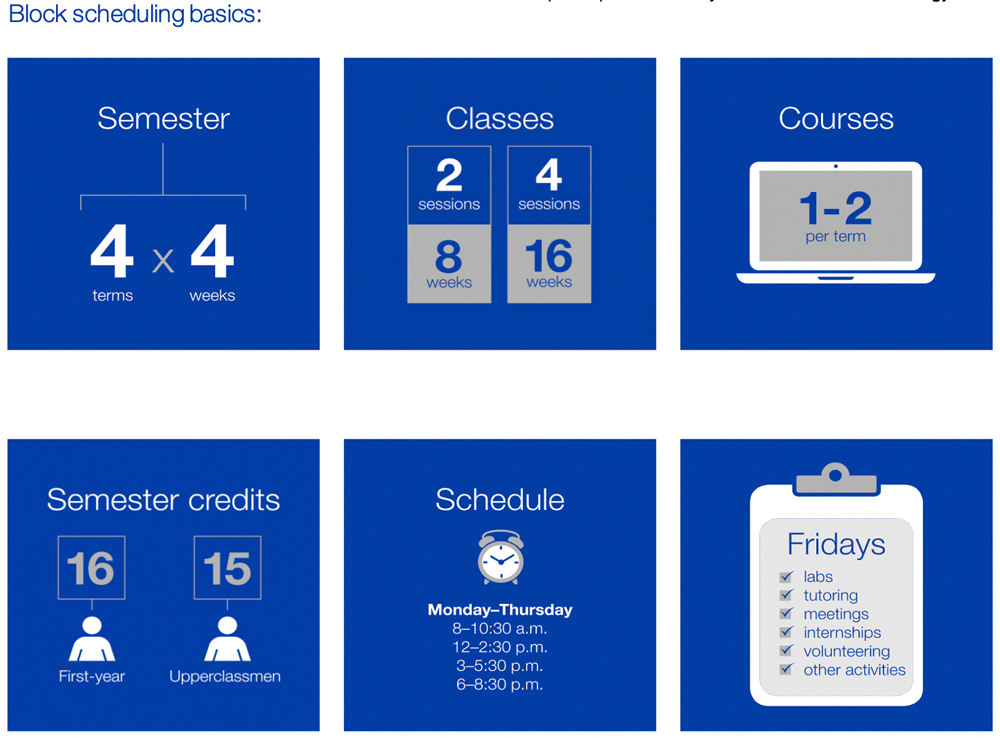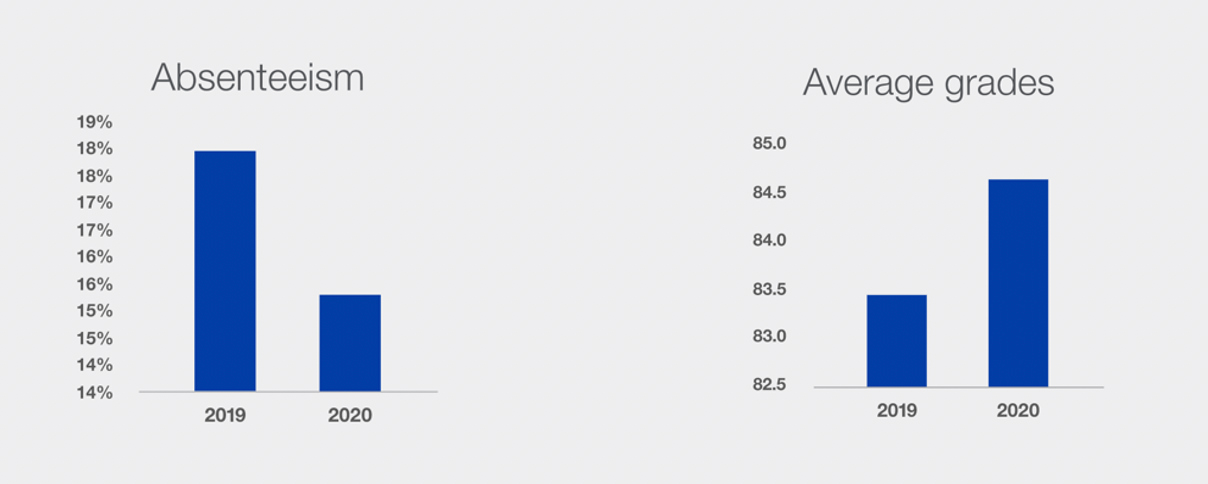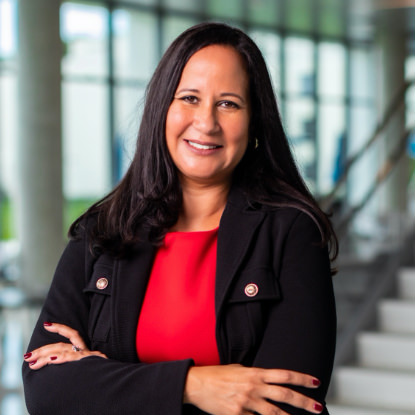
By Katrina Carter-Tellison
Vice President for Academic Affairs, Lynn University
At Lynn University in Boca Raton, Florida, the pandemic caused us to challenge long-held assumptions and reimagine everything from classroom schedules and course delivery methods to campus tours. As an independent institution with approximately 3,400 students from more than 100 counties, it was important to increase flexibility and reduce risk during a prolonged period of uncertainty with rapidly changing conditions.
We developed a plan for block scheduling as a way to minimize exposure for faculty and students and to enable administrators to implement a quick switch from in-person to remote instruction if necessary. We also sought to provide students with more options to fit their circumstances due to health issues or travel disruptions. After implementing the approach for a full academic year, we are seeing that this innovation precipitated by the pandemic has the potential to become a permanent feature.
Reimagining the 16-week semester
Block scheduling breaks up traditional 16-week semesters into four-week sessions with synchronous classes four days per week. Students can choose to focus on one course at a time or fast-track with two courses each session. They also have the option to complete the semester early, start late, take a break in the middle or stay for all four sessions.
Most students have “freestyle” time on Fridays to choose activities that help them advance their personal goals: faculty mentoring, labs, internships, employment, health and wellness, or student organizations and community service.
With block scheduling, each class is two and a half hours (compared to one-hour classes during a 16-week semester). To adapt to the extended class time, faculty reexamined their courses with a focus on experiential learning and essential outcomes. They flipped the classroom by having students read or watch recorded lectures outside of class so that the group could spend the extended daily class time on active learning activities instead of listening to a lecture. For example, Cassandra Korte, associate professor of scientific literacy and biology, added more detailed content to her class on the Canvas learning management system to allow students to better prepare for class each day and find answers to questions on their own. She created a series of videos in which she teaches lab techniques, such as how to use a micropipettor, so that students can learn manual skills beforehand and use lab time for in-depth exploration of concepts.
Associate Professor Sanne Unger created diverse assignment types for “Self and Society” and “Belief and Reason” courses in our Dialogues core curriculum. She offers students options for demonstrating competency so that they can customize how they work to match their individual schedules and learning styles. For example, rather than requiring all students to take a quiz every day to show that they have done the assigned reading, students may choose to submit a short video in which they explain the reading. She also follows a similar pattern of course assignments each week, because she finds that it helps students understand the course expectations and keep on track.
Some faculty required additional skills training to modify their courses for the block format. Content and delivery need to be adapted for the longer meeting times with students, so we engaged our instructional designers to help faculty create and implement engaging exercises for their classes.
We also collaborated with our IT team to introduce technology that aids faculty to deliver lessons, discussions and presentations. Our classrooms are fitted with camera technology that broadcasts the front of the classroom from the student’s perspective. Projectors display materials of faculty or virtual guest speakers, and up to six microphones ensure that a voice in any area of the room can be heard by all participants. Faculty can control the technology from the classroom’s instruction station or from their iPads. We also adopted Zoom’s enterprise services, allowing greater flexibility for virtual and hybrid classrooms, including break-out groups, chat features and more.

What we learned
Our initial experience with the format showed us that block scheduling fits project-based learning very well. It provides more choices and opportunities for students to learn at their own pace and add extra learning experiences in and out of the classroom.
Many faculty members reported that the new schedule has allowed extra time for students to immerse themselves in important topics and work together in the classroom. During a traditional semester, faculty typically send assignments home with students who submit them during the next scheduled class. With block scheduling, students can now work on assignments in class as a group. Instead of writing an essay and receiving feedback from the professor individually, students and faculty can work together to generate ideas and engage in an active process of analyzing sentence structure and composition, for example.
“I taught two courses in Session A, and I had better attendance—almost 100%—every class,” said Gary Carlin, associate professor of advertising and public relations. “The faster pace kept the students engaged and on task, and the work they delivered was as good, if not better, than in the 16-week semester.”
Class-free Fridays give professors time to prepare lessons and get to know their students better. “It’s a great time to catch up on grading papers, advising students, setting up our Center Court Speaker Series presenters, and preparing for the next week’s class sessions,” said Ted Curtis, associate professor of sports management.
We found that having planned programming on campus is essential for keeping students engaged on Fridays, so moving forward we will offer thematic programs. For example, during Women’s History Month in March, there will be activities each Friday, including speakers, book clubs and community service projects that delve into different aspects of women’s history and social impact.
We also learned that the four-week pace does not work as well for all types of courses. Students and professors in some programs, like music performance, found the block format more challenging. For example, the longer periods every day for dance or instrument practice is physically demanding, and students benefit from shorter practices with time in between to reflect and revise. In the science courses that include labs, the four-week pace overwhelmed some students. We are now adapting these courses into eight-week sessions with lectures and labs running simultaneously so that the learning in each can complement the other without students having to take two challenging four-week courses at once.
Student benefits
Quantitative and qualitative data collected during the first two semesters showed that block scheduling made a positive difference for many students. Absenteeism declined and average grades improved in Fall 2020 compared to the previous Fall 2019 semester without block scheduling. A survey also found that the majority of students preferred block scheduling over the traditional format.

With fewer courses at the same time, students told us that they have less anxiety over mid-terms and appreciate having more time to focus on projects and personal interests.
Agustina Tasende, class of 2023: “I believe it has made me a better student. As students, we sometimes feel like we don’t have enough breaks, and it’s a constant cycle of work. I can relate to this being a resident assistant, a full-time student and being in two clubs. Having Fridays free allows students to take a break and focus on ourselves or on our academics.”
Zay Allen, class of 2023: “Having class-free Fridays has impacted me a great deal because I am able to split my time up. I usually spend my Fridays being productive by completing homework that’s due or working for Career and Alumni Connections as a social media intern. Being able to focus my efforts on my internship on Fridays allows me to focus on school earlier in the week.”
Looking ahead
Based on faculty and student feedback, we are refining the block scheduling format for the future. Courses, such as chemistry, calculus, and certain performance-based courses, will now span two or four sessions offered in an eight- or 16-week format.
As we continue to evaluate results and look ahead, we will focus on providing more instructional support to help faculty optimize their courses. For example, our College of Education will provide more “teach the teachers” sessions to help faculty hone their skills and connect with students. Class proctors are also very helpful for facilitating hands-on and group exercises, so we will add classroom aides and engage other faculty members to assist and serve as understudies.
Tips for other university administrators
Adapt both content and delivery.
Longer class times should not simply mean longer lectures. The block format offers unique opportunities to focus on essential outcomes and engage students through hands-on learning, group exercises and dialogue. This requires faculty to take a fresh look at course content and how they deliver it. Good instructional designers are essential.
Instructional designers are important to the learning process, and this is especially true for delivering courses in the block format. Good instructional designers help faculty use technology to develop compelling content and engaging experiences for students. Enlist support from your best faculty to help their colleagues engage students.
Faculty are experts in their fields at the highest levels, but that doesn’t necessarily mean they are all expert presenters. Truly engaging students requires a specific set of skills that must be learned with experience. To help faculty gain that experience, enlist your best teachers to teach the teachers.
References
New block schedule provides flexibility for students, June 2020.
https://www.lynn.edu/news/2020/new-block-schedule-provides-flexibility-for-lynn-students The upside to remote learning, October 2020.
https://www.lynn.edu/publications/magazine/2020/the-upside-to-remote-learning Lynn University reimagines 2021–22 academic calendar, February 2021.
https://www.lynn.edu/news/2021/lynn-university-reimagines-academic-calendar-for-2021-22 Scheduling their way: how students use freestyle Fridays to enhance learning, October 2021.
https://www.lynn.edu/publications/magazine/2021/scheduling-their-way
 Dr. Katrina Carter-Tellison oversees Lynn University’s academic affairs department, including its award-winning iPad-powered curriculum. She is responsible for accreditation, faculty assessment and development, career services, international student services and social impact programs. She earned Lynn’s Faculty Member of the Year award, University of Miami’s Special Departmental Award for Ph.D., Tuition Graduate Dean Fellowship at the University of Miami, and Graduate Award to Inter-University Consortium for Political and Social Research (ICPSR) Summer Program.
Dr. Katrina Carter-Tellison oversees Lynn University’s academic affairs department, including its award-winning iPad-powered curriculum. She is responsible for accreditation, faculty assessment and development, career services, international student services and social impact programs. She earned Lynn’s Faculty Member of the Year award, University of Miami’s Special Departmental Award for Ph.D., Tuition Graduate Dean Fellowship at the University of Miami, and Graduate Award to Inter-University Consortium for Political and Social Research (ICPSR) Summer Program.

